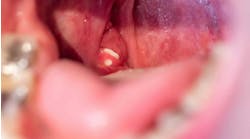Extreme difference
Dear RDH:
After reading "Extreme Hygiene = Extreme Team" in the September 2004 issue, I felt I had to write. "Extreme Hygiene" is an example of taking the "team concept" and "cross training" too far when they refer to everyone as "equals."
The dentist is not equal to the hygienist and assistant due to differences in education. The hygienist and assistant are also different from each other due to their education.
I am a registered dental hygienist and a registered nurse. In the hospital environment where I work, there are NAs (nursing assistants), LPNs, RNs, and MDs. Each work with the patient as a team - but each within their different duties as licensed by law due to their level of education. I am all for working as a team, but we are all different (not necessarily better, just different).
Lisa Daniels, RDH, RN
Tampa, Florida
Feeling fulfilled inside the walls
Dear RDH:
Thank you so much for your article "Behind Bars" in the September 2004 issue! It was refreshing to read of another "prison hygienist" working for the Department of Corrections.
I have been employed with the Washington State Dept. of Corrections for one year in a minimum security facility, and, like Jan Blancett, I left private practice due to burnout and stress-related injuries. This job is hands-down the most satisfying and fulfilling of my dental hygiene career. I know it sounds odd, and I get very funny looks from other hygienists when I tell them where I work, but these patients are the most compliant, appreciative, and cooperative people. Most have never seen a dentist or hygienist! I feel that the care our clinic provides is part of their rehabilitation.
Our clinic is a little different than Jan's. We employ a general dentist, an endodontist, three assistants, a denturist, and myself. We have five operatories, and, as you can probably tell from the staff we employ, we provide very comprehensive dental treatment to the inmates at McNeil Island Corrections Center. We do have a maximum security unit, and those inmates are brought up escorted in handcuffs for emergency treatment, but most of the general population are classified as minimum security and come and go unescorted. I do not have a security officer at my unit with me (he or she is down the hall) but I'm never left alone, and I've never felt unsafe. Before working in corrections in our state, employees attend six weeks of orientation, including self-defense, so we are very prepared for any event.
Corrections is definitely a different environment and not for everyone, but I have certainly found it to be a very rewarding career path! Thanks again for the article.
Senja Matthews, RDH, BS
McNeil Island Corrections Center
Steilacoom, Washington
With loving memories
Dear RDH:
This is a story of strength, courage, and inspiration. I had the pleasure of attending dental hygiene school with one of the most remarkable ladies I have ever met. Michelle Bissen-Klabunde was a single mother with three children. At the time, they were 10, 11, and 12 years of age. Michelle was a woman of strong faith and goals of becoming a registered dental hygienist.
We started the dental hygiene program at Iowa Western Community College (IWCC) in August 2000. In early May 2001, Michelle began to have excruciating back pain. By the summer session, she could barely stand up straight. During our summer break, she went to the doctor and found out she had breast and bone cancer. She decided to take a year off to go through chemotherapy and radiation. The thought of not returning to IWCC dental hygiene program never occurred to Michelle. She continually spoke of getting better and starting her second year of school.
Michelle returned to school in August 2002 but soon became violently ill. A trip to her oncologist confirmed the cancer had metastasized to her brain. Michelle was determined to finish the dental hygiene program and graduate. She would go to school, leave for radiation, and then return to school to finish the day. We all know the intensity level of dental hygiene programs and what a tremendous amount of strength this took. Michelle never complained, nor did she miss a day of school. As a matter of fact, she usually had a smile on her face.
On May 15, 2003, Michelle graduated from the IWCC dental hygiene program. She also passed her national boards and CRDTS. Michelle took the summer to spend time with her children. She worked as a dental hygienist until her cancer started affecting her balance. Last April, she had to leave her position as her health declined rapidly. On August 31, 2004, she was called to live with our Father in heaven.
Knowing how strongly Michelle felt about education, her family set up a scholarship in Michelle's memory. Anyone wishing to donate to this fund can mail checks to IWCC, 2700 College Road, Council Bluffs, IA 51503, payable to: Michelle Bissen-Klabunde Scholarship Fund. As we face trials in our own lives, may a portion of Michelle's strength and courage flow through all of us.
Karie Jarvis, RDH
Medford, Oregon
When Andrea Hester Adkins, RDH, looks at the long arc of her dental hygiene career, what she sees is loyalty. "That's one of the big reasons why I'm still working four days a week. I don't want to leave my patients any more than they want to see me go." Some of those patients have stayed with her through four dentists and 31 years. When she moves, they move.
A native of East Liverpool, Ohio, where she still lives, Andrea graduated from West Liberty State College near Wheeling, WV, in 1973. "At the time, all I wanted was to go to college, come back home, and get married. I chose hygiene because it was in health care, and I could be out in two years. The associate's degree was just what I needed."
For the next three decades she practiced continuously, dropping down to one day a week when her children were small, then adding days as they got older. She stayed with her first two bosses until each retired. Currently, she works two days a week for Bruce Gibbs, DDS, a general dentist in East Liverpool, and two days for Jay Reznik, DMD, a pediatric dentist in Monaca, Pa.
Though she has never actually burned out, Andrea has experienced a renewed interest in dental hygiene recently. "I think my career sort of got a boost two years ago for two reasons. First, I started working in a pediatric office, which I'd never done. I'm fascinated by the psychological twists and turns of pediatric management. That change gave me two days with children, and two with adults. Each job is a nice break from the other."
And second, she bought magnification loupes. She'd been using drugstore "reading glasses" at work for a few years, and finds the loupes are much more efficient. "They help with my posture, they make probing faster and easier, and I even use them to read X-rays. I don't know how I got along without them."
Andrea calls her children her favorite hobby. She and Larry are the proud parents of Tim, 28, a researcher for a publishing company in Van Nuys, Calif., and Eric, 26, a fifth-grade teacher in Roswell, Ga.
She and Larry have traveled extensively through the Caribbean, and like weekend getaways closer to home. They walk together whenever they can, and Andrea also enjoys scrapbooking.
Andrea was thrilled with the photo session for this cover shot.
"The session was just so nice. My husband was able to go with me, and we had a great time. The makeup artist worked her magic, and I was the center of attention for the afternoon, with people fussing over me. What an opportunity!"
When Andrea thinks about the future of dental hygiene, one particular problem has been on her mind.
"Years ago, I went to a nursing home regularly to see a long-time patient. I brushed her teeth and flossed them twice a week. I did that for about a year, until she became non-compliant.
"Remembering her makes me think about the baby boomers. When we're old enough to be in nursing homes, most of us will still have our teeth. Who will take care of them? Someone can go into a nursing home today with a full set of teeth, and two years later the teeth are all bad, because nursing home attendants don't care enough about oral hygiene. There needs to be a turnaround in public dental health to address that in the future."
Even after 31 years, Andrea isn't finished with dental hygiene. She expects to work into her sixties, at least, which is a big relief to her loyal patients.
- Cathy Hester Seckman, RDH







